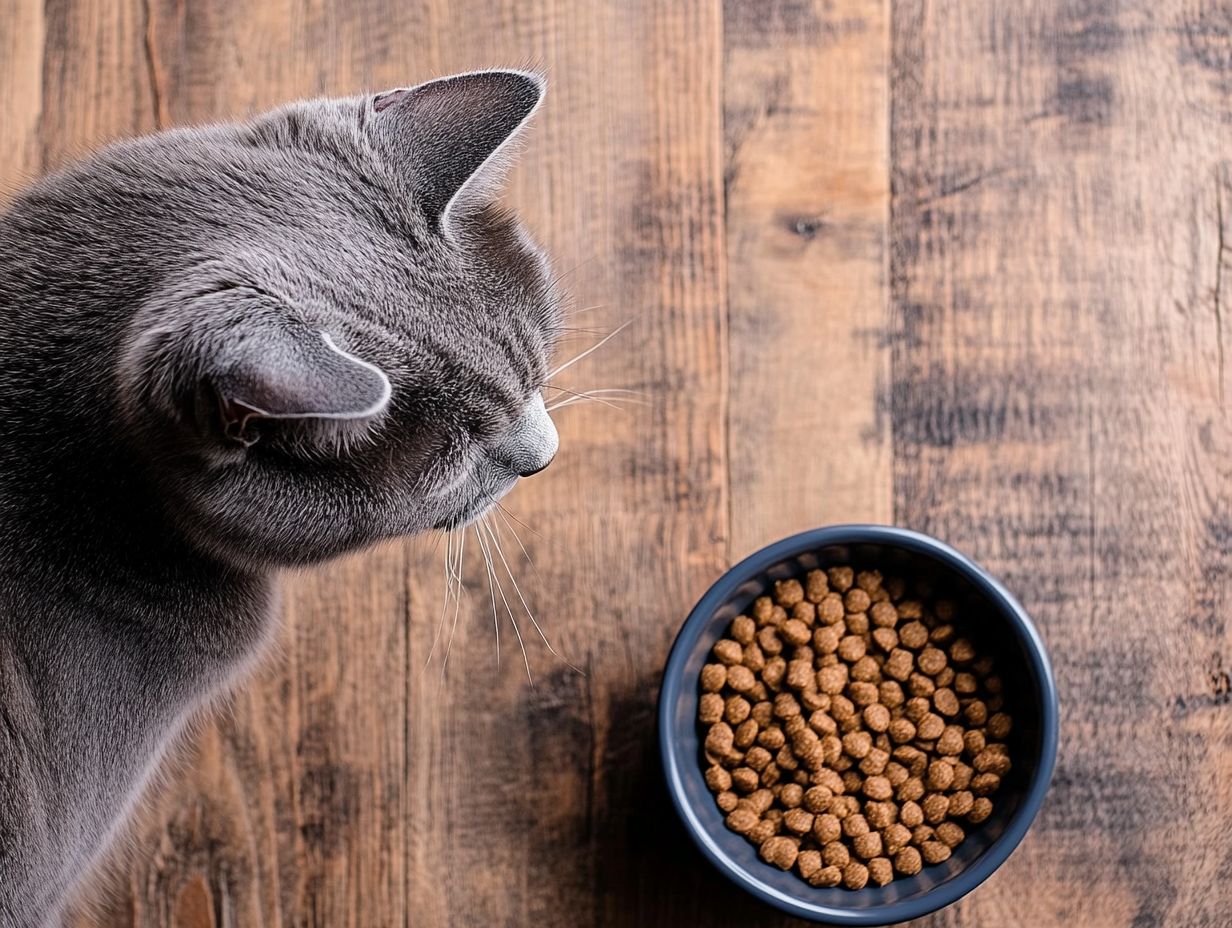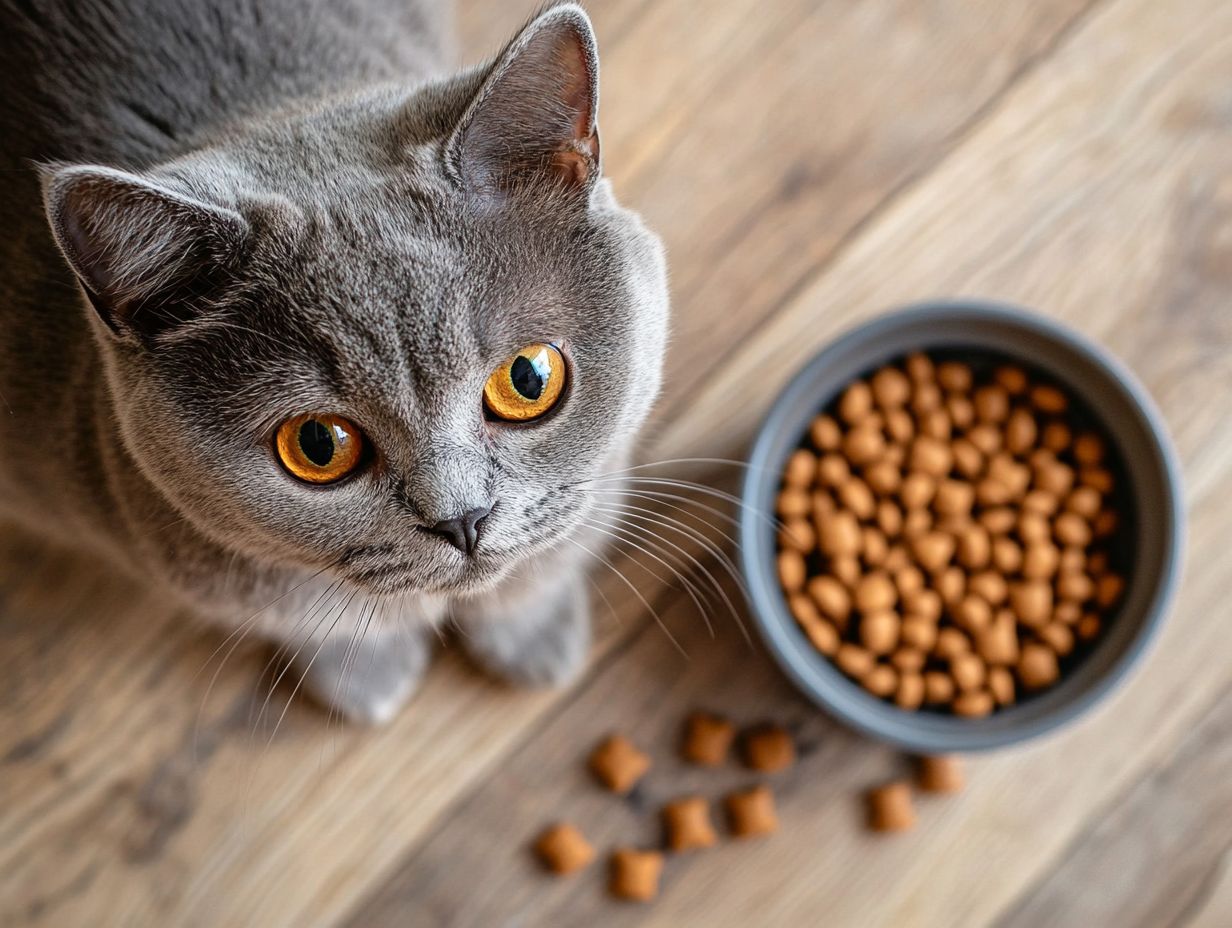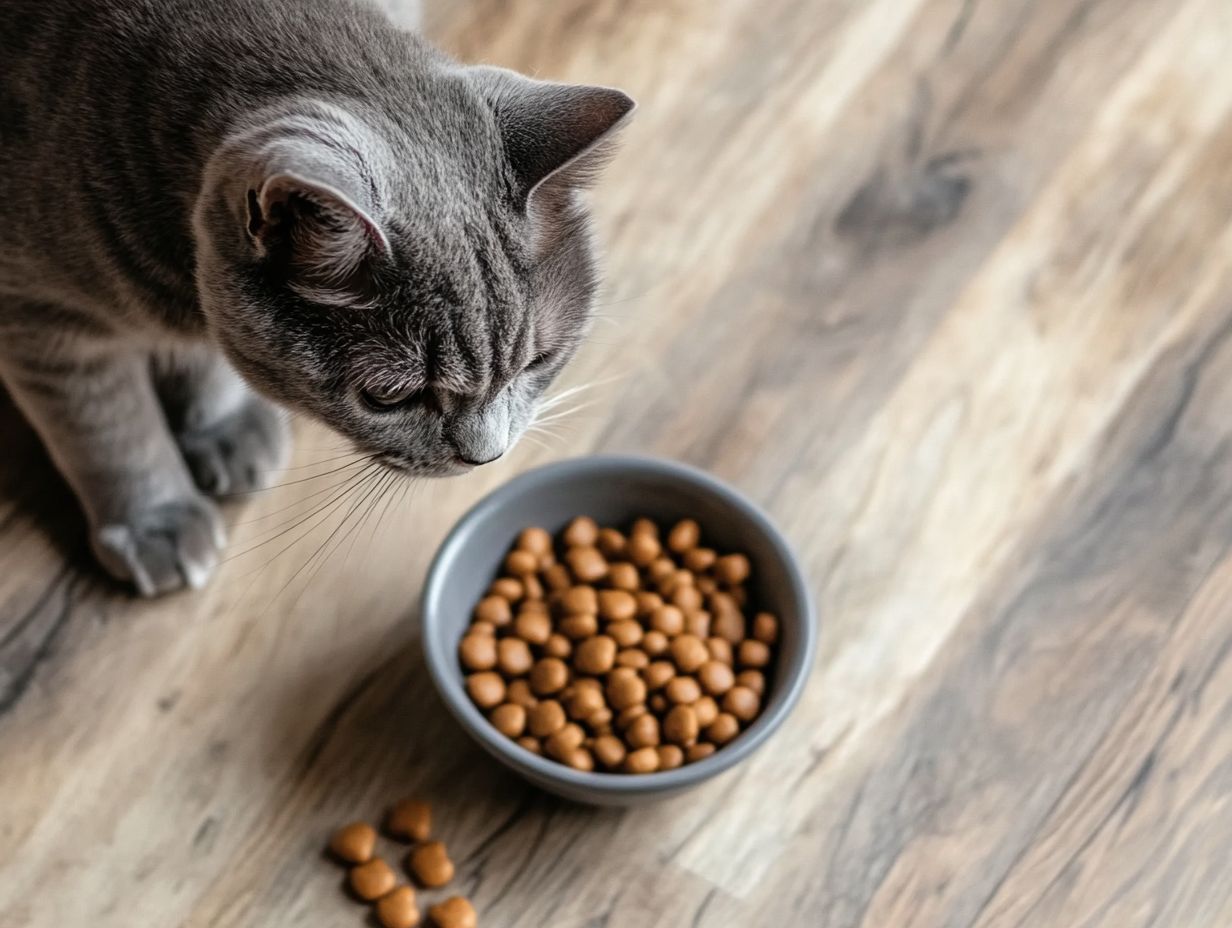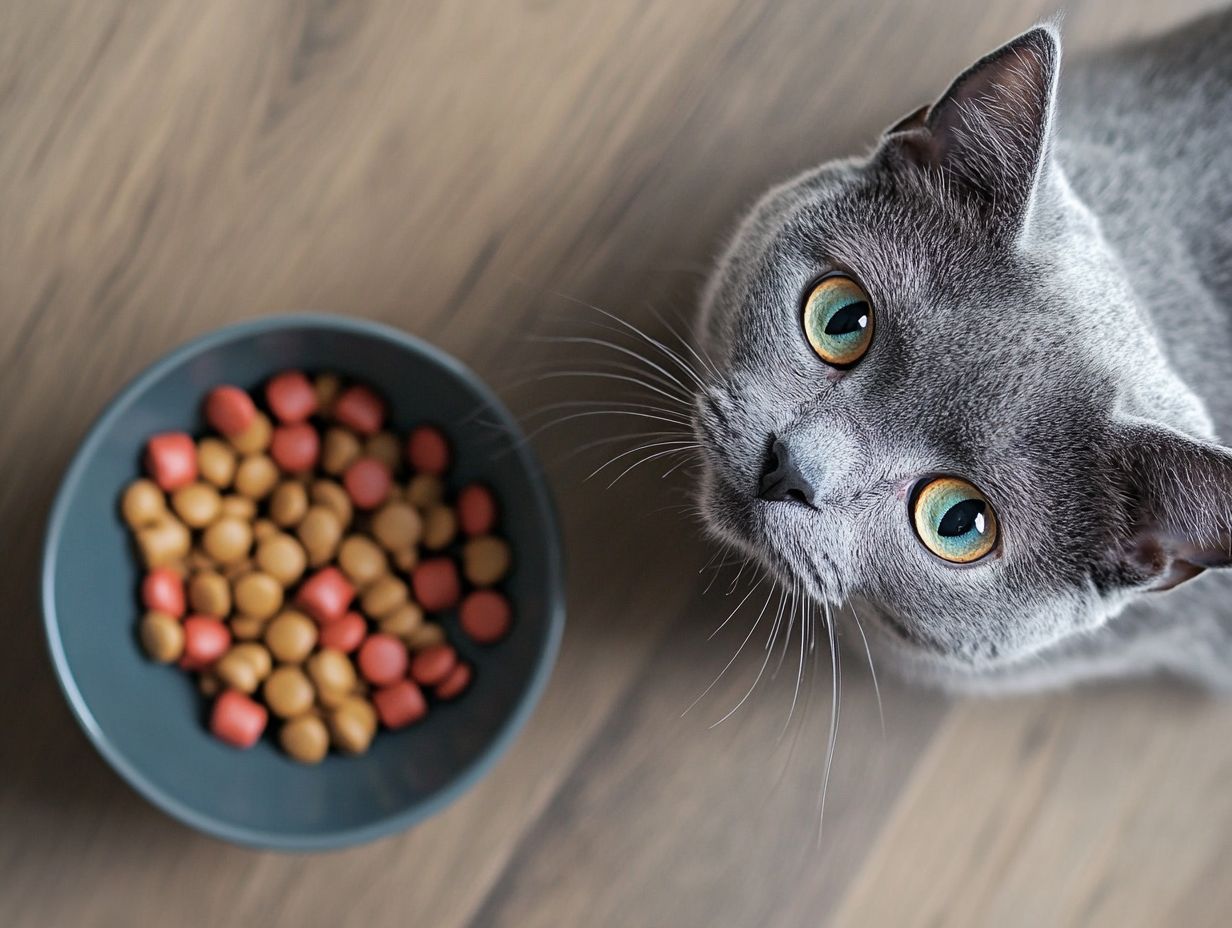As our feline friends age, their dietary needs shift, making it essential to choose the right food to support their health and well-being.
Dry cat food, often a popular choice for senior cats, can offer benefits that cater specifically to their unique nutritional requirements. When selecting dry food, focus on high-quality ingredients that meet the nutritional standards set by AAFCO and WSAVA.
This article explores what dry cat food is, why it’s recommended for older cats, and the potential risks to be aware of.
Learn how to choose the best dry food and tips for transitioning your senior cat to this diet, ensuring they stay happy and healthy in their golden years.
Key Takeaways:

What Is Dry Cat Food?
Dry cat food, commonly known as kibble, is a type of cat food that is dehydrated to extend its shelf life and preserve its nutritional content. Many brands formulate their dry food to meet the complete nutritional needs of various cat age groups, from kittens to adult cats.
The unique kibble texture not only provides essential nutrients but also encourages chewing, which can promote oral hygiene and help reduce plaque build-up and dental tartar in cats. However, if a cat already has dental issues, dry food may not be suitable.
Why Is Dry Cat Food Recommended for Senior Cats?
Dry cat food is often recommended for senior cats because it addresses their unique nutritional needs and offers several health benefits. As cats age, they become more susceptible to dental issues, weight management challenges, and overall nutritional deficiencies.
What Are the Nutritional Needs of Senior Cats?
Senior cats have specific nutritional needs that differ from those of younger felines and adult cats. Their diets should be enriched with essential nutrients, such as omega-6 fatty acids and Vitamin E, and must include animal-source proteins due to their obligate carnivore nature. A lack of quality protein can lead to deficiencies and health issues.
It is equally important to maintain an appropriate fat content to provide energy without leading to excessive weight gain, allowing for a balance between caloric intake and their adaptive metabolic changes.
Additionally, dental care nutrition plays a vital role in preventing plaque build-up and tartar formation, which can lead to serious health issues. Owners should implement a dental care program, look for kibble designed to promote oral health, or incorporate dental treats into their cats’ diet.
To assess the nutritional quality of cat food, focus on the ingredient list, ensuring that high-protein sources are listed at the top, and choose products that meet AAFCO standards for senior feline diets, supporting overall health.
What Are the Benefits of Dry Cat Food for Senior Cats?
The benefits of dry cat food for senior cats include improved dental health, effective weight management, and essential nutrients that support the aging process. When formulated appropriately, dry cat food can enhance the quality of life for older cats by addressing various health issues related to aging.
1. Promotes Dental Health
The texture of dry cat food aids in dental care by requiring chewing, which helps remove plaque and prevent tartar buildup. This method not only eliminates food particles but also targets harmful bacteria associated with poor dental hygiene.
Some formulas feature unique kibble shapes designed to encourage chewing and help clean teeth. For more information on selecting appropriate diets, consult with your veterinarian or pet nutritionist.
Dietary Considerations for Specific Health Conditions
For senior cats with specific health conditions like kidney disease or diabetes, it’s vital to consult with a veterinarian to identify appropriate nutrient profiles. Some dry foods may be too high in phosphorus or unhealthy fats, which could exacerbate existing health issues.
Monitoring Health During Transition
When transitioning your senior cat to a new diet, monitor their weight and overall health closely. Regular veterinary check-ups are important to ensure their dietary needs are being met effectively.
Proper Storage and Handling Practices
Store dry cat food in a cool, dry place to maintain its freshness. Ensure the packaging is resealable, and check for signs of spoilage before feeding. Discard any food that has an unusual smell or appearance.
Additionally, regular veterinary visits are essential, as they provide professional cleanings and evaluations that enhance the effectiveness of at-home care routines.
2. Helps with Weight Management

Nutritionally balanced dry cat food can aid in weight management for senior cats by promoting a balanced calorie intake and helping maintain a healthy weight through controlled daily feedings. As pets age, it becomes increasingly important to monitor their weight closely due to the various health risks associated with obesity, such as diabetes and joint problems. It is important to note that while dry cat food can be convenient and cost-effective, it should not be the sole diet for all cats, as different cats have different dietary needs.
Dry food is not only a more affordable option for portion control, but it also encourages pet owners to establish a feeding routine. By measuring out servings, caregivers can ensure that their cats receive the appropriate nutritional intake without overfeeding, as overfeeding dry food can lead to obesity.
Regular veterinary check-ups are essential for monitoring weight changes and adjusting diets accordingly. Additionally, incorporating light playtime can further support overall well-being.
3. Contains Essential Nutrients
Nutritionally balanced dry cat food provides essential nutrients that are crucial for senior cats, including proteins, fats, and vitamins, all of which support their overall health and well-being, as part of a complete nutrition plan.
The proteins in these foods often come from animal-source protein sources, such as chicken or fish, and play a vital role in maintaining muscle mass and energy levels in older cats.
Healthy fats, like omega-3 and omega-6 fatty acids from fish oil or flaxseed, contribute to a shiny coat and promote joint health, helping to alleviate discomfort in aging cats.
Additionally, a well-balanced blend of vitamins and minerals supports important functions such as immune health and digestion. It is advisable to consult with a veterinarian when considering dietary changes for senior cats, especially if they have pre-existing health conditions.
Brands like Hill’s Science utilize their expertise in pet nutrition to create scientifically formulated products that cater to the unique dietary needs of older cats. When choosing dry cat food, look for options that have AAFCO approval to ensure compliance with nutritional standards.
4. Cost-effective and Pet Owner Satisfaction
Dry cat food is an economical feeding option for cat owners, offering complete nutrition at a lower cost than wet food. Its shelf stability, longer shelf life, and reduced spoilage mean that a single purchase can last a considerable amount of time, making it ideal for cost-conscious pet owners.
Cats are often easily transitioned to dry food, as many enjoy its texture and flavor. Additionally, owners appreciate the convenience of meal preparation that dry food provides, as it eliminates the mess associated with wet food while ensuring that cats receive essential nutrients, enhancing pet owner satisfaction.
Many brands also offer strong product guarantees, giving pet owners confidence in their purchases. This enhances perceived value and fosters trust between consumers and manufacturers.
What Are the Potential Risks of Dry Cat Food for Senior Cats?
Dry cat food poses certain risks, particularly for senior cats, including dehydration and digestive issues.
1. Can Lead to Dehydration
One of the primary concerns related to dry cat food is its potential to cause dehydration, particularly if fresh water is not consistently available. This issue is especially important for senior cats, as their hydration needs can become more critical due to age-related changes in their bodies. Prolonged dehydration can lead to severe health problems, such as kidney issues and urinary tract infections.
To help ensure that cats drink enough water daily, pet owners can consider placing multiple water bowls throughout the house to encourage drinking. Additionally, incorporating wet food into their diet can significantly enhance moisture intake, as it contains much more water than dry kibble. For more information on selecting the right food, check out Dry Cat Food for Seniors: Maintaining Dental Health in Older Cats.
Experimenting with different water fountains may also encourage increased water consumption, as many cats are attracted to moving water. Routine veterinary evaluations are recommended to assess hydration status in senior cats.
2. May Cause Digestive Issues
Some common ingredients in dry cat food, such as grains, can lead to potential allergic reactions or intolerances in certain cats. It’s important for pet owners to monitor their cats for any signs of digestive discomfort or allergies.
Proper storage practices are essential to prevent spoilage of dry food. Store dry cat food in a cool, dry place, and keep it in an airtight container to maintain freshness and prevent contamination.
Some senior cats may occasionally experience digestive issues with dry cat food, which can lead to health problems such as constipation or diarrhea. This discomfort is often linked to the high carbohydrate content and lower moisture levels typically found in dry food, making it more challenging for their aging systems to digest. It’s essential to monitor their health, and if digestive problems persist, consult with a veterinarian, as chronic issues may signal underlying health conditions. Additionally, individual cats have varying tolerances to dry food; some may thrive on it while others may not, reinforcing the need for personalized dietary plans.
Sudden dietary changes—whether due to a new brand or an abrupt discontinuation of their usual wet food—can further disturb their already sensitive digestive systems. To ease these transitions and promote digestive health, owners should consider gradually introducing new foods over a week or more, mixing them into the existing diet to allow the cat’s system time to adjust.
Incorporating wet food or adding water to the cat’s diet can also increase liquid intake, making digestion easier and reducing the likelihood of gastrointestinal issues.
3. Can Be High in Carbohydrates

Certain dry cat food brands are high in carbohydrates and lack proper dental care, which can be harmful to senior cats with specific dietary needs. Excess carbohydrates can lead to weight gain, diabetes, and other complications, particularly in older cats whose metabolic rates are naturally lower. Regular monitoring of weight and glucose levels is vital to ensure their health.
Since senior cats require balanced nutrition tailored to their age, caregivers must carefully evaluate the food ingredients, check for AAFCO approval on the label, and monitor their intake to maintain a healthy weight and overall vitality in their later years.
Opting for low-carb options and following veterinarian recommendations can help clarify the best dietary choices for the well-being of these beloved pets.
How to Choose the Best Dry Cat Food for Senior Cats?
Choosing the right dry cat food is crucial for maintaining both nutrition and dental care. Brands like Royal Canin and Hills Science Diet offer specialized formulas.
Choosing the best dry cat food for senior cats requires careful consideration of high-quality ingredients, their nutritional needs, and specific feeding recommendations that are suitable for their age and health status. Following veterinarian recommendations can ensure you meet these needs effectively.
1. Look for High-quality Ingredients
High-quality ingredients are essential when purchasing dry cat food for senior cats, as they cater to the specific nutritional needs of older felines. It is important that the protein comes from premium sources such as real meat, fish, or poultry, as this helps preserve muscle mass and overall health. While whole grains or vegetables can be beneficial, they should not be the primary ingredient in a cat’s diet, reinforcing the need for animal-source proteins as obligate carnivores.
Additionally, the inclusion of whole grains or vegetables provides the necessary fiber for digestive regularity. When examining product labels, ensure that the first few ingredients are recognizable protein sources rather than fillers or by-products, which typically offer little nutritional value.
Beneficial additives, such as omega fatty acids, vitamins, and minerals, should also be present to promote skin health, joint function, and immune resilience. However, not all cats may require supplements; therefore, any additional supplementation should be discussed with a veterinarian to avoid unnecessary or potentially harmful excesses. This highlights the importance of selecting formulas that provide a balanced and nutritious diet appropriate for a senior cat’s life stage.
2. Consider the Nutritional Needs
The nutritional needs of senior cats are crucial for selecting appropriate dry cat food, as they require specific nutrient profiles to promote their well-being. As cats age, their metabolic activity decreases, necessitating diets rich in high-quality protein to maintain muscle mass, as well as balanced fats to sustain their energy levels. It is also important to ensure adequate hydration, as wet food can serve as an alternative source of moisture, which is crucial for senior cats who may be less inclined to drink water.
Essential vitamins, such as B vitamins and antioxidants, play a vital role in supporting a healthy immune system and overall vitality. Additionally, important minerals like taurine and phosphorus contribute to proper cardiac and kidney function.
Caregivers should meticulously examine the ingredient list and nutrient breakdown of pet food products to determine whether the food meets these essential dietary requirements. Ideally, this analysis should be done in consultation with a veterinary professional who can provide guidance on the best options for individual pets. It’s also essential to recommend proper food storage practices, such as keeping dry food in a cool, dry place and checking for expiration dates, to ensure the food’s freshness and nutritional quality.
Additionally, any dietary changes should be gradual to minimize gastrointestinal upset, and caregivers should consult a veterinarian if considering a switch to raw or homemade diets, outlining the risks associated with such diets.
3. Check for Specific Senior Formulas
When choosing dry cat food, it’s beneficial to look for specific senior formulas that cater to the unique nutritional needs of older cats. These diets should meet the AAFCO nutrient profiles for senior cats, which recommend specific levels of protein (at least 26%) and fat (at least 9%) to support their health. Additionally, these formulas often contain adjusted vitamins and minerals that support joint health, cognitive function, and a robust immune response as cats age.
Veterinary professionals recommend selecting the right food as crucial for keeping senior cats healthy and active for as long as possible. Recommendations for senior diets can help pet owners navigate the multitude of available options and choose products that meet their cat’s specific requirements.
4. Pay Attention to the Texture
The texture of dry cat food is an important consideration for senior cats, as it affects both their dental health and overall enjoyment of eating. The right kibble texture can contribute significantly to these factors.
Notably, certain kibble textures can assist with dental care. Kibble designed to break apart in a crunchy manner can provide an abrasive effect that helps scrub away plaque and tartar during chewing. This mechanical cleaning action can prevent periodontal disease, reducing inflammation, bleeding of the gums, and bad breath. Veterinary studies suggest that kibbles with a specific hardness and size can be more effective at promoting dental health.
When selecting food products, look for those specifically labeled as having a dental care texture, as they are specially designed to maximize these benefits. Additionally, larger, flattened pieces of kibble that do not break apart easily are recommended by veterinarians for supporting your cat’s oral health.
How to Transition Your Senior Cat to Dry Food?

Transitioning a senior cat to dry food should be done carefully to minimize stress and ensure a smooth adaptation to dietary changes while also preventing potential digestive issues. A sudden change can lead to digestive upset or refusal to eat. It is advisable to consult with a veterinarian for personalized advice based on your cat’s health status.
Step-by-step Guide to Transitioning:
- Start by mixing a small amount of dry food with their current food.
- Gradually increase the proportion of dry food over 7-10 days, observing your cat’s response.
- Monitor for any signs of digestive upset, such as diarrhea or vomiting.
- Once fully transitioned, maintain regular feeding schedules and consult your vet if issues arise.
How to Encourage Your Senior Cat to Eat Dry Food?
There are several ways to encourage a senior cat to eat dry food. These methods aim to enhance the cat’s interest in the food while ensuring it receives adequate nutrition and hydration.
- Mix wet and dry food to increase palatability.
- Warm the food slightly to enhance aroma.
- Use food toppers or sprinkles to make the meal more enticing.
- Ensure access to fresh water at all times to maintain hydration.
Frequently Asked Questions
What is the importance of dry cat food for seniors in maintaining dental health?
Dry cat food is crucial for senior cats as it helps to maintain their dental health. The hard kibble texture assists in scraping off plaque and tartar build-up on their teeth, preventing dental diseases. Studies have shown that regular kibble consumption can significantly reduce the incidence of gingivitis and other dental issues.
What makes dry cat food different from other types of cat food?
Dry cat food is specifically designed to promote dental health in cats. Its crunchy texture and shape are formulated to scrape off plaque and tartar on their teeth, reducing the risk of dental problems, as supported by veterinary research.
Can dry cat food really help with dental issues in older cats?
Yes, dry cat food can be extremely beneficial in preventing and managing dental problems in older cats. Its abrasive texture helps to remove plaque and tartar, keeping their teeth and gums healthy. Regular veterinary check-ups are essential to monitor dental health.
How often should I feed my senior cat dry cat food?
It is recommended to feed your senior cat dry cat food at least twice a day, following the serving size instructions on the packaging. This will ensure they receive the necessary nutrients and maintain good dental health.
Are there any specific ingredients to look for in dry cat food for seniors?
When choosing dry cat food for seniors, look for ingredients such as taurine, antioxidants, and omega-3 fatty acids. These nutrients are vital for their overall health, supporting heart function, reducing inflammation, and promoting strong teeth and gums.
What are some signs that my senior cat may be experiencing dental issues?
If your senior cat has bad breath, difficulty eating, or visible signs of dental disease such as swollen gums, discolored teeth, or tooth resorption, it is important to consult with your veterinarian. Regular dental check-ups can help catch these issues early and establish a suitable dental care plan.